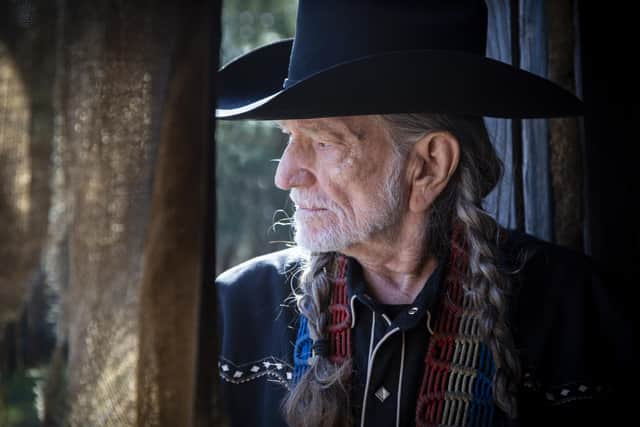Album reviews: Van Morrison | Willie Nelson | Lichen Slow


Van Morrison: Moving On Skiffle (Virgin) ***
Willie Nelson: I Don’t Know A Thing About Love: The Songs of Harlan Howard (Legacy Recordings) ***
Lichen Slow: Rest Lurks (Rock Action) ***
Still seizing the day after all these years, some of our most beloved musical veterans are producing new albums at a rate of knots – good/bad news for the Neil Young completists, say, while Van Morrison and Willie Nelson continue to exhibit a mania for recording.
Advertisement
Hide AdAdvertisement
Hide AdThe former has hit the 2020s with annual (lengthy) album releases. He follows two albums of originals, Latest Record Project, Volume 1 and What’s It Gonna Take?, with a tribute to his love of skiffle. Moving On Skiffle (even the title is in a hurry) is a bumper 23 track collection of standards which laid the groundwork for rock’n’roll, rhythm’n’blues and therefore much of modern popular music.
According to its UK ambassador Lonnie Donegan, skiffle was/is a mongrel music, rather than a genre in its own right, its distinctive sound a result of its lo-fi instrumentation. This was punk before punk, as anyone could cobble together the kit – washboard, acoustic guitar, tea chest bass, harmonica – and have a go.
Morrison, however, is not interested in recreating the lo-fi rockabilly rattle of these backyard bands. His are hi-fi versions of the repertoire with massed doo-wop and gospel backing vocals, and slick R&B, boogie woogie, honky tonkin’ and bluegrass-influenced arrangements.


Carter Family standard Worried Man Blues is divested of the blues, while two Hank Williams’ classics, I’m So Lonesome I Could Cry and Cold Cold Heart, are somewhat overcooked, the latter with peppy pedal steel solo, a pacey offbeat and saxophone intervention.
There are songs about trains, of course, including Elizabeth Cotton’s Freight Train, intriguing fare such as Scottish folk song Gypsy Davy, recorded by Woody Guthrie among others, and the breezy death threats of Careless Love, plus the by now customary Morrison moan about killjoy governments and their dastardly health interventions. “They’re not going to stop me ranting,” he pledges on his version of Mama Don’t Allow, retitled as Gov Don’t Allow.
He and his band finally slow it down on the mellow nine-minute Green Rocky Road, treating the soothing, freeform arrangement with care rather than bashing it out like a professional pub cover.
At the grand old age of 89, Willie Nelson continues his ferocious run of album releases. The country music legend was among the first non-jazz artists to present an appreciation of the Great American Songbook with his mega-selling 1978 album Stardust. He could easily fall back on some of these greatest hits once again; instead he has used his regular covers albums to highlight the catalogues of genre trailblazers such as Cindy Walker, Ray Price and now Harlan Howard, the man who famously described the essence of country music as “three chords and the truth”.


Advertisement
Hide AdAdvertisement
Hide AdHoward found multiple ways to approach love, heartache and relationships as Nelson demonstrates across the ten songs on I Don’t Know A Thing About Love, from the impish Tiger by the Tail via plaintive western swing ballad The Chokin’ Kind and the aching Streets of Baltimore to cost of living blues number Busted, previously recorded by Johnny Cash and Ray Charles, and delivered here with Nelson’s customary mellifluous ease.
Lichen Slow are a new band comprising Malcolm Middleton of Arab Strap and Joel Harries of Team Leader. Their contrasting styles come together harmoniously on debut album Rest Lurks, with songs which look inward to their mental health and outward to the state of the art – “the story arc is horrendous” sings Middleton on Imposter Syndrome, deploring that “even good bands are singing shit songs these days” on the peppy Preset. Harries, meanwhile, lends his angelic tenor to the more expansive ambient indie numbers such as Pick Over The Bones and Tense and the melancholic folk-inflected laments It’s Not What We Thought and Tire.
CLASSICAL
Neil Tòmas Smith: Stop Motion Music (www.ntsmusic.co.uk) *****
Sometimes, you’ll find a composer working quietly within a bubble who has something fascinating to offer a wider audience. Edinburgh-based Neil Tòmas Smith is one such example. His music is cerebral in conception, exploring the existential context of sound within the parameters of space and movement. How does that manifest itself in practice? The answer lies in his debut album, and a thoroughly stimulating set of chamber pieces – featuring a variable ensemble of cross-genre collaborators from flautists Carla Rees and Delia Stevens, to experimental drummer Simon Roth and “speaking harpist” Esther Swift – that elicits a compelling, ruminative charm. The title track, Stop Motion Music, refracts live acoustical performance through an enticing electroacoustic prism. Roth imaginatively explores the thoughtful, caressing sound world of Scaffold for Simon. Progression of Mary, for solo Baroque Flute, evokes a luminous, primitive beauty. The whole album is powerful and moving. Ken Walton
FOLK
Rura: Dusk Moon (Rura Music) ****
The title of Rura’s fourth studio album, along with Calum E McClure’s delicate woodland sleeve art, may smack of haiku. The content is much more wide-screen, if not without its own poetry, as the award-winning quartet sweep into an expansive, Runrig-ish opening track, Journeys Home. This anthemic quality continues into the lead-in of the title track, before Jack Smedley’s fiddle overlays a pacey melody, joined by Steven Blake’s pipes as the band shift into characteristic cruise gear. Think of Today, inspired by Christine de Luca’s wedding poem, Journey, is a wistful fiddle melody that becomes a glad march while The Grove sees Adam Brown’s spiky guitar riff bolstered by fiddle before the pipes herald an exhilarating reel. There’s a post-lockdown exhilaration to Rise, while things really rock up in The Crossing, with shrilling fiddle and chattering pipes over urgently driven guitar and bodhran – Rura in full flight. Jim Gilchrist